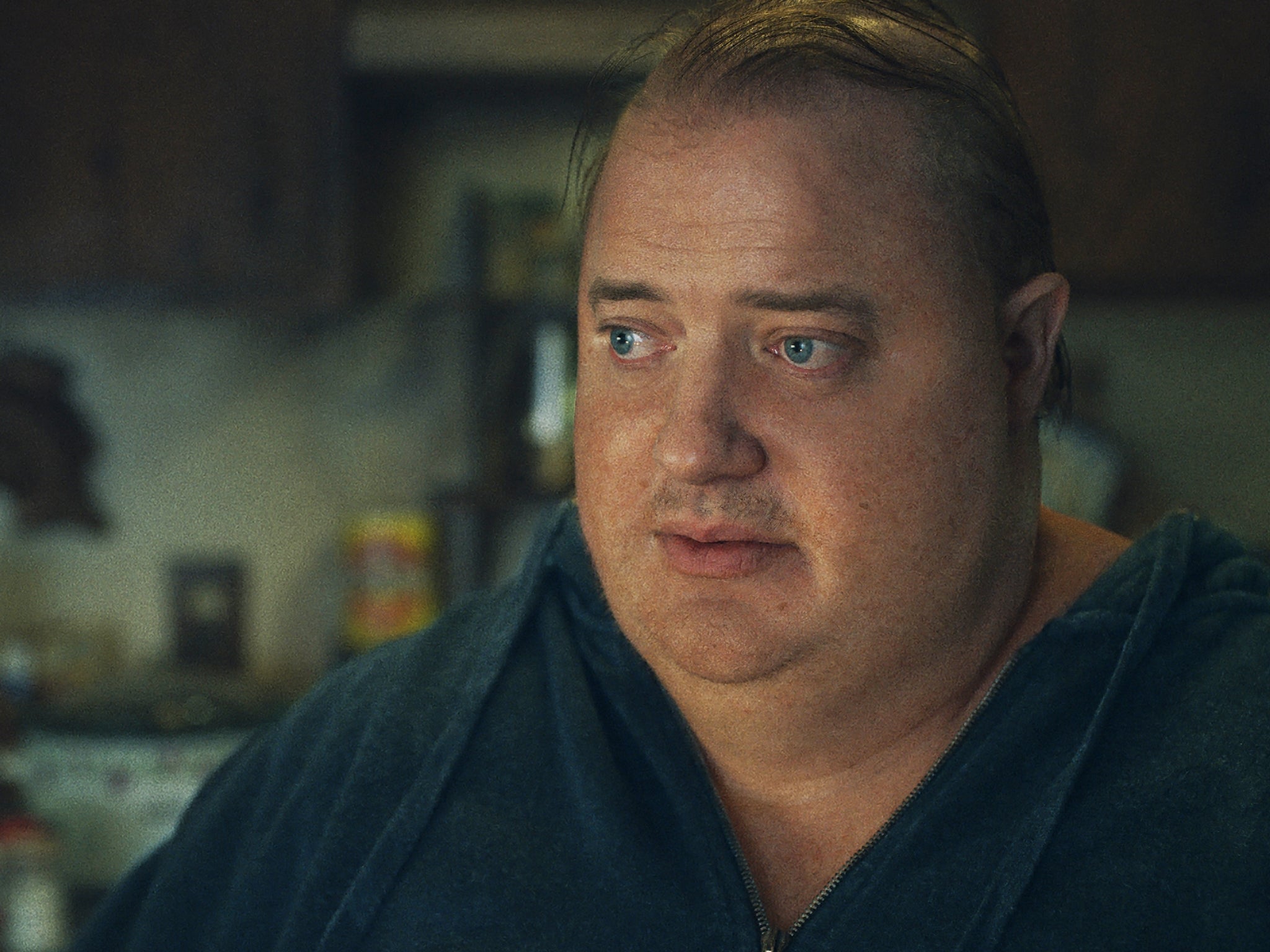Don’t blame Brendan Fraser for The Whale’s crass fatphobia
Fraser’s controversial Oscar-tipped turn as an obese man saw the actor radically alter his appearance through weight gain and prosthetics. Hollywood’s fixation with extreme physical transformations is at fault, writes Louis Chilton – and it’s starting to stifle the whole industry


Maybe The Whale was doomed from the start. Darren Aronofsky’s mawkish Oscar-bait drama – starring Brendan Fraser as a morbidly obese man reeling from the death of his partner – seemed to break all the rules of contemporary good taste. And not deliberately. For the role, Fraser gained a significant amount of weight, and augmented this with prosthetics; The Whale is built entirely around his startling physical transformation. His character, however, is presented as an object of great pity, a viewpoint the film seems to find profound. Accusations of fatphobia have been rampant. (Eloise Hendy neatly explains the backlash in this piece about Hollywood’s problematic fat suit resurgence.) Critically speaking, The Whale has endured a pretty rigorous harpooning.
Yet while The Whale’s Best Picture hopes may have been beached by its polarised reception, Fraser’s own reputation has emerged from the film unscathed – and arguably even bolstered. The Mummy star is the bookies’ favourite to take home the Oscar for Best Actor, and is currently in the throes of a full-fledged career comeback. If he wins the award, it will, for many, be a moment of mixed emotions. On the one hand, the win would represent overdue recognition for a talented actor whom the film industry has treated very poorly. On the other, a blithe endorsement of entrenched fatphobic tropes. But can Fraser really be held responsible for the film’s ethical failings? I’m not so sure.
Actors are conditioned to leap at the chance to do films like The Whale. Increasingly, it feels like industry bodies such as the Academy are simply more interested in radical physical transformations than they are in emotional ones. Look at the actors who have won or been nominated for Oscars in recent years, and you’ll find no shortage of performances predicated on this kind of shallow rub-your-eyes-with-disbelief transformation. Gary Oldman as Winston Churchill in Darkest Hour. Christian Bale as Dick Cheney in Vice (and American Hustle). George Clooney in Syriana. It’s not just a matter of accumulating mass, either; sometimes actors become skeletally thin, such as Joaquin Phoenix in Joker or Matthew McConaughey in Dallas Buyers Club.
It’s not necessarily that actors like Fraser are sitting down and cynically picking the sort of plum body-altering roles that are most likely to yield Oscar gold. (Though you would be forgiven for reading a certain amount of awards-hungry cynicism into The Whale’s whole deal.) But as the Academy, and other awards bodies, continue to heap plaudits on these same types of “[BLANK] is unrecognisable in [BLANK]” acting roles, the criteria for what people consider a great acting performance start to shift.
Of course, it’s not always healthy for an actor to gain or lose significant amounts of weight for a project. Jared Leto claimed to have given himself gout by downing pints of microwaved ice cream with olive oil and soy sauce each day to gain weight for Chapter 27, a 2007 drama in which he played Mark David Chapman. There’s not really any justification for an actor to put themselves through such a medically inadvisable process. Ultimately, Leto’s transformation didn’t amount to all that much, as the film languished in obscurity. (Still, he got more from his efforts than Ryan Gosling did for The Lovely Bones: after director Peter Jackson discovered Gosling had gained 60 pounds without consulting him, he recast the part with Mark Wahlberg.)
So, should actors be turning down these roles? It might not be that easy. Body transformations are, to some extent, an inevitable part of acting. Nearly all roles require actors to alter their physicality to some extent; only when these tweaks become extreme do we start commenting on them. The desire to tackle a body transformation role seems to come naturally to many actors: it can be seen as something of a mettle test. A demonstration of range. Of commitment. It surely stems from the same sort of process-oriented self-seriousness as Method acting – or what people on social media might refer to as “a case of ‘Actor Brain’”. The Academy, which after all includes many actors in its voting body, is unlikely to stop rewarding these sorts of roles any time soon.
What’s more, just because a performance involves a drastic physical change doesn’t automatically reduce it to a gimmick. Strip away the problematic artifice of Fraser’s role in The Whale, and you’re left with a strong, emotive turn, undoubtedly one of the actor’s finest. It would probably be unfair to blame Fraser for wanting to take on such a challenging role. But it’s troubling how few substantial, awards-ready roles there are now that don’t involve prosthetics and a 12-week diet plan.
‘The Whale’ is out in cinemas now
Join our commenting forum
Join thought-provoking conversations, follow other Independent readers and see their replies
Comments


Bookmark popover
Removed from bookmarks